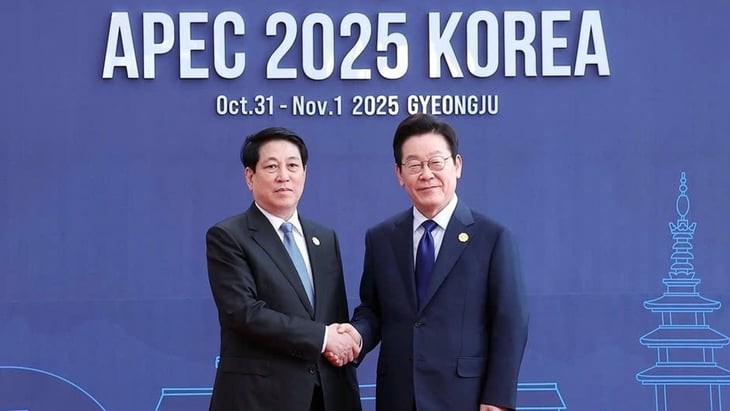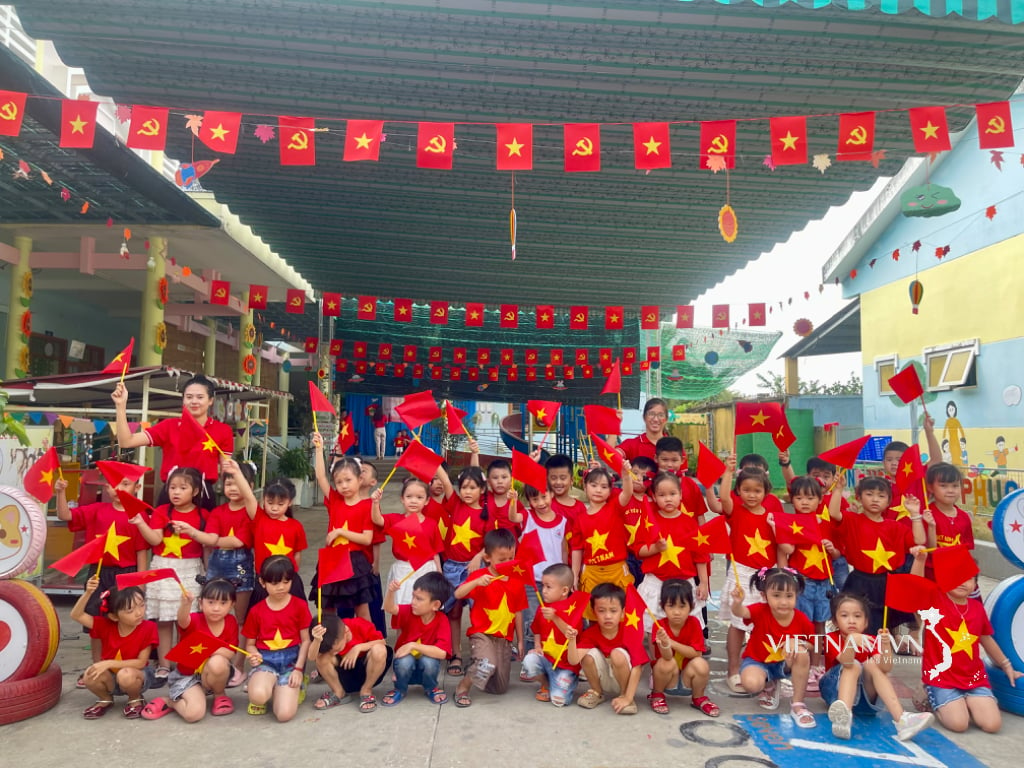
President Luong Cuong shakes hands with South Korean President Lee Jae Myung at APEC - Photo: VNA
As the host country, South Korea has chosen three main priorities for the 2025 Asia- Pacific Economic Cooperation (APEC) Summit Week: "connectivity, innovation, and prosperity," while also making artificial intelligence (AI) cooperation a central topic of discussion.
AI collaboration bridge
Speaking to Tuoi Tre newspaper , Dr. Majo George, Head of the Economics Department at the University of Economics and Finance Ho Chi Minh City, assessed APEC as a rare multilateral mechanism that includes both the US and China – two countries leading the global AI revolution. Therefore, this forum plays a unique role in bridging cooperation between economies.
"APEC's strength lies in its voluntary, non-binding model, which allows economies with different political and legal systems to coordinate through common principles."
"Existing frameworks such as the Cross-Border Privacy Rule (CBPR) and the region's Cross-Border Privacy Enforcement Agreement (CPEA) have demonstrated that pragmatic cooperation can succeed without imposing uniform legislation," expert George noted.
Leveraging that strength, at the APEC Ministers' Meeting on Digital and AI in Incheon last August, ministers from member economies issued a joint statement committing to pursuing responsible, transparent, and human-centered AI technology.
"APEC remains one of the few platforms where superpowers are present, and where Asia-Pacific economies maintain dialogue and trust. President Luong Cuong's speech at the APEC Business Summit captured this vision, affirming that the modern industrial revolution, spearheaded by AI, must be driven by cooperation, responsibility, and inclusiveness," Dr. George emphasized.
Concurring with this view, Hendrick Sin, Chairman of the Hong Kong (China) AI Grant Program Committee, affirmed in the China Daily on October 31st that the "openness and rapid spread" of AI technology make international cooperation extremely necessary for AI governance.
Mr. Sin emphasized that, as the region's "most influential economic cooperation platform," APEC is considered to be in a "unique position to promote dialogue and build consensus" among member economies.
Earlier, at the APEC Finance Ministers' Meeting on October 22, Hong Kong's financial minister, Paul Chan, also called on APEC to strengthen cooperation through capacity building, knowledge sharing, and technical assistance to bridge the digital development gap.
He also called on the region to facilitate dialogues on AI governance, cross-border data transmission and digital trade, while strengthening regional innovation and technology ecosystems.
Connecting Vietnam's financial hub
Dr. Majo George affirmed that APEC's role extends beyond simply promoting AI cooperation. He pointed out that for efforts to build international financial centers in Ho Chi Minh City and Da Nang to bear fruit, these two centers must combine financial resources with data connectivity and digital trust.
In the current context, APEC can act as a "pipeline network" connecting Vietnam's two financial centers with other centers in the Pacific region.
According to George, with its strengths in electronics manufacturing, dynamic digital services, and policy space for innovation in the fintech sector, Vietnam can play a central connecting role, where pioneering AI technologies are adapted to suit regional realities.
"President Luong Cuong's call for open and inclusive AI development at APEC underscores Vietnam's potential to become a key player in building a trans-Pacific cooperation network," Dr. George affirmed.
Towards that goal, Mr. George proposed several pillars of action for APEC to both leverage the strengths of its developed members and narrow the development gap between economies. Prominent among these are the adoption of paperless trade, the implementation of cross-border pilot projects for fintech and AI in the financial sector, and the connection of regulatory bodies of emerging international financial centers.
Vietnam's proposals
Speaking at the APEC Business Summit 2025 on October 30, President Luong Cuong affirmed that the world is entering the Fourth Industrial Revolution, with the fundamental difference being AI technology at an unprecedented pace.
The President emphasized that this industrial revolution must be led from the outset by a spirit of cooperation, creating opportunities for all economies to participate, contribute, and thrive. In particular, the APEC business community needs to act together with governments to implement responsible AI, promoting open and inclusive AI.
Speaking at the first session of the APEC Leaders' Meeting 2025 on October 31, President Luong Cuong proposed three key areas that APEC should focus on.
First, major bottlenecks in the region's supply chain and infrastructure need to be addressed through the efficient digitalization of customs clearance processes.
Secondly, it is necessary to promote trade and investment cooperation through efforts to realize the Asia-Pacific Free Trade Agreement.
Thirdly, it is necessary to support the private sector, especially small and medium-sized enterprises, in accessing capital, technology, and markets, and improving management capacity to adapt and develop in the digital age.
Source: https://tuoitre.vn/trien-vong-hop-tac-ai-trong-apec-20251101002310923.htm






































![[Photo] Prime Minister Pham Minh Chinh presides over the conference announcing the establishment of the International Finance Centre in Vietnam.](/_next/image?url=https%3A%2F%2Fvphoto.vietnam.vn%2Fthumb%2F1200x675%2Fvietnam%2Fresource%2FIMAGE%2F2025%2F12%2F21%2F1766309817714_ndo_br_dsc-3400-jpg.webp&w=3840&q=75)




































































Comment (0)